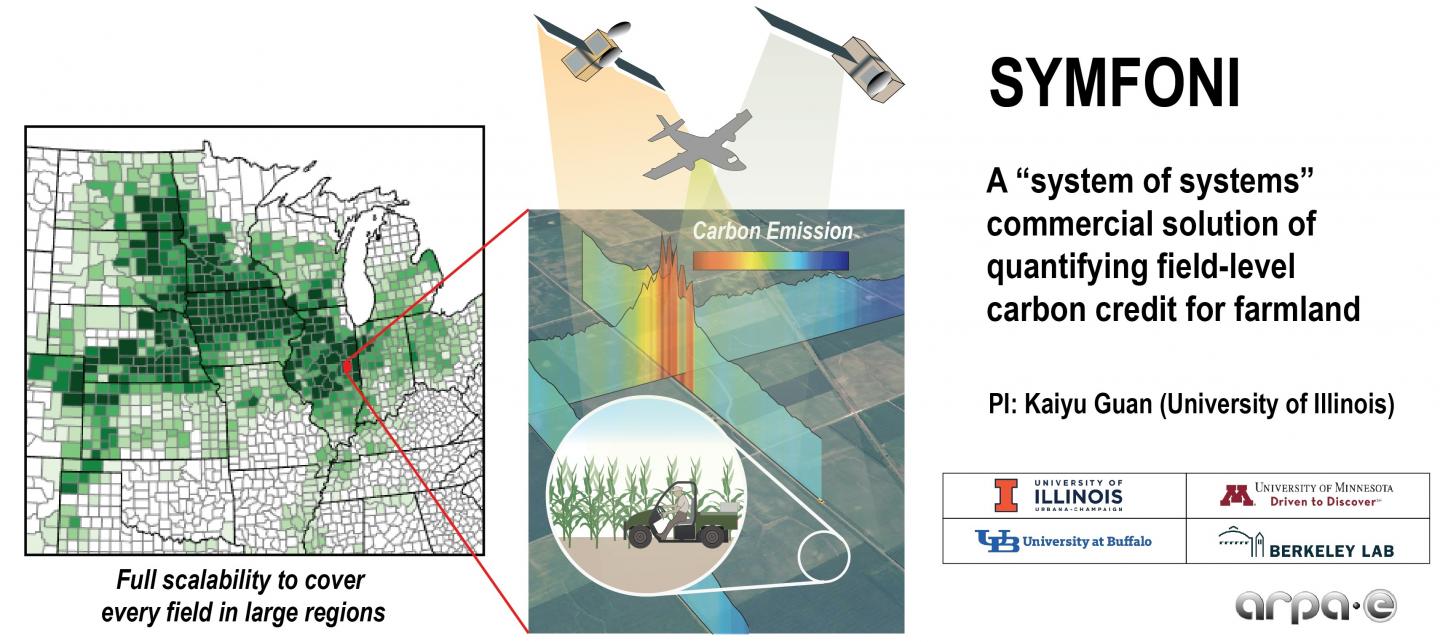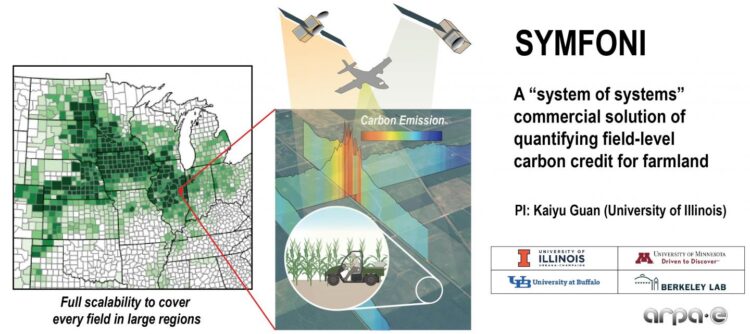
Credit: University of Illinois
URBANA, Ill. – The University of Illinois has been awarded $4.5 million from the U.S. Department of Energy’s Advanced Research Projects Agency-Energy (ARPA-E) through its “Systems for Monitoring and Analytics for Renewable Transportation Fuels from Agricultural Resources and Management” (SMARTFARM) program. The funding will be used to calculate farm-scale carbon credits, allowing individual farmers to understand the value of their land and practices towards carbon trading markets.
“We are developing novel technology to enable a thriving market-based solution to promote agricultural sustainability. Our developed technology will enable a carbon credit market, which will incentivize farmers to adopt management practices that benefit the soil, the environment, and then reward themselves. For example, if a certain practice sequesters more carbon, farmers can reduce their carbon emissions and earn financial rewards. These credits can be collected and then used in the open market to offset others toward meeting lower carbon-emission goals,” says Kaiyu Guan, Blue Waters Professor in the Department of Natural Resources and Environmental Sciences and National Center for Supercomputing Applications (NCSA) at Illinois and principal investigator on the multi-institutional project that also includes the University of Minnesota, USDA-ARS, the University of Buffalo, and Lawrence Berkeley National Lab.
The project, named “SYMFONI,” allows accurate and rapid field-level quantification of carbon intensity for every individual field across the U.S. and can be seamlessly scaled up to the global scale. This is made possible through the integration of field-based observations with satellite and aerial hyperspectral data, physics-guided deep learning, mobile soil sensing, and supercomputing. Guan says the system builds a generic framework that will flexibly integrate newer sensor technologies as they become available, meaning the output will continue to improve over time.
Importantly, the Illinois-led SMARTFARM project is tasked with delivering commercial products that will enable stakeholders to calculate the value of various ecosystem services related to crop and land management decisions. To achieve ARPA-E’s “technology-to-market” goal and commercialize the project’s results, the team has partnered with Aspiring Universe, a tech spin-off from the University of Illinois that aims to de-risk and sustain modern agriculture for humanity.
“We couldn’t be prouder of Kaiyu and his team’s efforts toward a more sustainable future for agriculture and the planet. Innovations from researchers within the College of Agricultural, Consumer and Environmental Sciences [ACES], along with our partners across the UIUC campus, have been changing the world for 150 years, and with investments like this from ARPA-E, we’ll continue moving forward to a brighter future,” says Germán Bollero, associate dean for research in the College of ACES at Illinois.
The Illinois team is the only group nationwide to be twice awarded funds in ARPA-E’s SMARTFARM program in its two funding phases. The same team leads a Phase 1 project ($3.3 million) to collect gold-standard carbon emission data at the farm scale and builds the foundation for testing Phase 2 technologies. The Illinois-led project also represents the largest portion of SMARTFARM funding, receiving 27% of the total funds distributed in the current round of funding.
“These distinctions position Illinois at center stage nationally as a leader in quantifying ecosystem services for farmland,” says Evan H. DeLucia, G. William Arends Professor of Biology, founding director of the Institute for Sustainability, Energy, and Environment (iSEE) at Illinois, and co-principal investigator of the SYMFONI project. Both Illinois SMARTFARM projects are managed through iSEE.
The project is in line with ARPA-E’s SMARTFARM goals, which include development of technologies to bridge the data gap in the biofuel supply chain by quantifying feedstock-related greenhouse gas emissions and soil carbon dynamics at the field level. These technologies will allow for improved efficiency in feedstock production and enable new ag-sector carbon removal and management opportunities.
The project team includes nine members across Illinois’ Urbana-Champaign campus. They include Kaiyu Guan, DoKyoung Lee, Chongya Jiang, Bin Peng, and Sheng Wang from the College of ACES; Jian Peng from Grainger College of Engineering; Evan DeLucia and Wendy Yang from the College of Liberal Arts and Sciences; and Carl Bernacchi from USDA-ARS. Kaiyu Guan and Bin Peng also are affiliated with NCSA. Additional team members include Zhenong Jin and Vipin Kumar from the University of Minnesota, Kang Sun from the University of Buffalo, and Jinyun Tang from Lawrence Berkeley National Lab.
###
“SYMFONI” Project: The “System of Systems” Solutions for Commercial Field-Level Quantification of Soil Organic Carbon and Nitrous Oxide Emission for Scalable Applications (SYMFONI) – $4.5 million: Accurate and rapid field-level quantification of carbon intensity at a regional scale is critical to facilitate adoption of new technologies to increase the bioeconomy’s feedstock productivity and reduce its carbon footprint. The University of Illinois will develop a commercial solution, SYMFONI, to estimate soil organic carbon and the dynamics of nitrous oxide emissions at an individual field level. The solution can be scaled up to perform per-field estimates for an entire region. SYMFONI is a “system of systems” solution that integrates airborne-satellite remote sensing, process-based modeling, deep learning, atmospheric inversion, field-level sensing, and high-performance computing.
Aspiring Universe: Aspiring Universe employs a comprehensive suite of tools that use remote sensing, process models and artificial intelligence to evaluate past, current and future crop land performance, including crop rotation and management history, yield, water use, nutrient dynamics and carbon sequestration. With a bottom-up method that can be aggregated across any global region, the company provides critical insights to businesses throughout the agriculture value chain. The insights provided by Aspiring Universe’s proprietary technology create value for customers engaged in crop production and processing, as well as companies that provide inputs and financial services to growers. As an agtech spinoff from the University of Illinois Urbana-Champaign, and through an ongoing collaboration, the company licensed technologies originally created at the University of Illinois Urbana-Champaign.
College of ACES: The College of Agricultural, Consumer and Environmental Sciences (ACES) at the University of Illinois provides solutions to the world’s most critical challenges to create abundant food and energy, a healthy environment, and successful families and communities. Although proudly ranked among the top 30 agricultural schools worldwide, we are more than agriculture. ACES is a diverse college with top-rated programs in engineering, finance and economics, nutritional science, and so much more. While our faculty and students choose a host of specialties and areas of interest, we all work toward the common goal of improving daily life for people close to home and around the world. Learn more at: https:/
Media Contact
Lauren Quinn
[email protected]
Original Source
https:/





